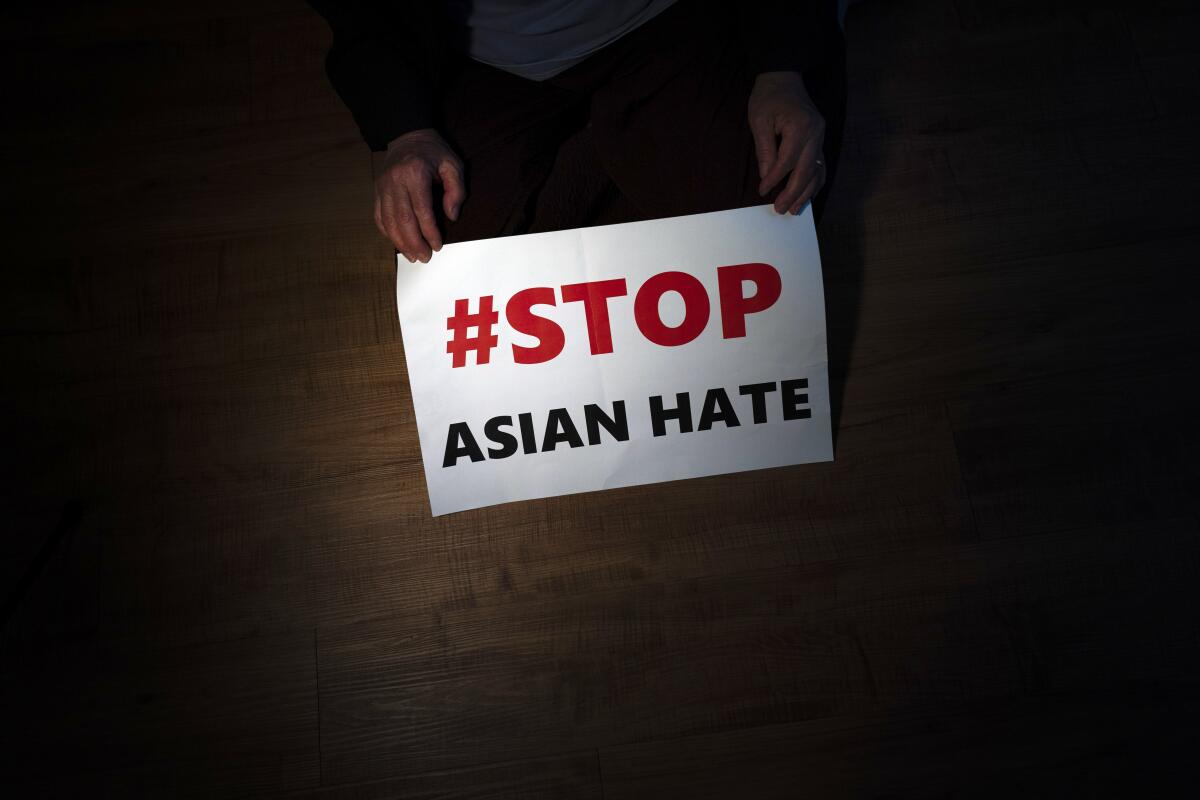New laws address anti-Asian hate in the long-term, but what about feeling safe right now?

Good morning, and welcome to the Essential California newsletter. It’s Thursday, Sept. 21. I’m Jeong Park, coming to you from Mid-City in Los Angeles. I cover Asian American communities.
Last week, two stories about anti-Asian hate grabbed my attention.
On Sept. 13, California Gov. Gavin Newsom signed two bills seeking to address harassment — often based on race — on public transit and in businesses. The new laws will create a model survey for transit agencies to help them gather data about the harassment of passengers and a pilot program that recognizes businesses that provide “safe and welcoming” environments for customers.
The same day, the Citizen personal safety app announced it was providing up to 20,000 Asian Americans in the Bay Area with a free one-year subscription to its premium service, which provides 24/7 access to what the company calls “live safety agents” who can track users’ locations and help them assess their safety. Agents could even call 911 on the users’ behalf.
Both try to address anti-Asian hate, but their differences illustrate the complexity of the issue.
One approach focuses on institutions, while another looks at individuals. One is aimed at laying the groundwork for a potential long-term solution, while another wants to make people feel safe now.
As part of the Stop AAPI Hate coalition, which tracked more than 4,000 reports of anti-Asian hate incidents in California between 2020 and 2022, Annie Lee sees the two bills Newsom signed as essential.
Anti-Asian-American and Pacific Islander hate “has been happening for a long time, but people started to listen when we started collecting data,” said Lee, the director of policy at Chinese for Affirmative Action based in San Francisco. “That’s the power of data. It shines the light.”
It doesn’t make sense, Lee said, to address anti-Asian hate through increased policing. After all, many of those hate incidents, which may consist of someone yelling ethnic slurs or making inappropriate gestures, are not criminal. It’s incumbent upon the institutions such as public transit agencies to create a safe environment, and those bills lay the groundwork for that to happen, Lee said.
“What we need to do,” Lee said, “is to shift our culture and understanding of how we treat each other and put pressure on institutions to change.”
But for Carl Chan, the president of Oakland’s Chinatown Chamber of Commerce, increased policing and partnership with groups and companies like Citizen are essential.
Citizen has faced criticism for potentially encouraging overpolicing and racial profiling. Last year, the app incorrectly labeled someone as an arson suspect in a fire in Pacific Palisades. Some have raised privacy concerns about its premium service, although the company’s director of government affairs and public policy, Trevor Chandler, said user data is deleted every 30 days. Hundreds of those self-identifying as Asian Americans in the Bay Area have already reached out to ask for the service, Chandler said.
After hearing about Citizen’s partnership with the Chinese American Assn. of Commerce in San Francisco, Chan said he wanted to see how his group could work with the company as well.
Chan has long railed against what he calls “defunding” of the Oakland Police Department, although in the last few years, the money it has gotten from the city has increased consistently. Chan say apps such as Citizen can supplement the police service.
“People getting hurt, people getting killed, it’s no comfort to the families, the community or the entire country,” Chan said. “It’s time for us to focus again on how to keep everyone safe.... People are dying.”
And now, here’s what’s happening across California:
Note: Some of the sites we link to may limit the number of stories you can access without subscribing.
The L.A. mayoral debate. U.S. Rep. Karen Bass and real estate developer Rick Caruso battered each other with charges of misbehavior and inauthenticity during an hourlong debate, the latest rhetorical escalation in the once relatively genteel campaign for mayor of Los Angeles. Los Angeles Times
How did cannabis legalization go so wrong in California? Much of the negative fallout from California’s legalization of pot — be it corruption or unchecked growth of the illegal market — can be traced back to decisions made during the early days of the legalization push, including concessions made by supporters of cannabis legalization who had seen previous efforts fizzle out and wanted to ensure its approval by voters. Los Angeles Times
Will women rule in the 2022 California election? The roster of female lawmakers could rise to 45 of the 120 seats, as redistricting, a wave of retirements and energized women voters present a big opportunity. CalMatters
L.A. STORIES
We fed an artificial intelligence program some evocative texts about L.A., such as an art critic’s assessment of the Los Angeles Basin as looking like “coffee-stained carpet with a few pointy rocks dropped on top.” Take a look at the images that were created. It’s a real kick — and as weird as you might imagine. Los Angeles Times
Finding community at Black Market Flea. A monthly, one-of-a-kind outdoor bazaar is not your average flea market. You may see DJs spinning hip-hop, folks cooking oxtails or even people on a roller skating rink. LAist
Check out "The Times" podcast for essential news and more
These days, waking up to current events can be, well, daunting. If you’re seeking a more balanced news diet, “The Times” podcast is for you. Gustavo Arellano, along with a diverse set of reporters from the award-winning L.A. Times newsroom, delivers the most interesting stories from the Los Angeles Times every Monday, Wednesday and Friday. Listen and subscribe wherever you get your podcasts.
POLITICS AND GOVERNMENT
Ten congressional races in California that could decide the control of Congress. Those districts extend from the 3rd Congressional District, which stretches as far north as the tip of Lassen Volcanic National Park, to the 49th Congressional District in coastal Orange and San Diego counties. Los Angeles Times
Tom Girardi gave millions to Democratic politicians. But did the disgraced L.A. legal legend actually steal from his clients to give those donations? A Times review of contributions and law firm financial records raises questions. Los Angeles Times
Struggling downtown San Jose. Sales taxes in the area have plunged 38.5% below their pre-COVID levels, according to the city’s director of economic development. It’s due to work-from-home policies, but the city hopes Google’s proposed “Downtown West” neighborhood can help. Mercury News
CRIME AND JAILS
How a basketball prodigy is making her comeback after she was kidnapped. Aquira DeCosta was one of the nation’s most coveted girls’ basketball recruits four years ago. But she’s trying to rebuild her life after a man with a history of human trafficking and exploitation kidnapped her in February. San Francisco Chronicle
Golden State Warriors’ rivalry with San Quentin State Prison. Members of the team’s front office and coaching staff have been making an annual visit to San Quentin for most of the past 10 years to play pickup basketball against a prison team. Mercury News
Support our journalism
HEALTH AND THE ENVIRONMENT
What it’s like to work at an Amazon warehouse during a heat wave. One worker recorded a 121-degree temperature on the tarmac at an air freight hub in San Bernardino, according to a first-of-its-kind report about conditions at Amazon during extreme temperatures. Amazon took some immediate steps, but some workers said those weren’t enough. Los Angeles Times
The electricity crisis could “bankrupt” a Humboldt County city. Pacific Gas and Electric Co. estimates it will cost $900 million to upgrade the infrastructure around southern Humboldt County, which includes cities such as Fortuna. Meanwhile, Fortuna’s city manager says PG&E is unable to provide adequate electricity for development projects underway in the region. Eureka Times-Standard
CALIFORNIA CULTURE
How long does it take to kayak from California to Hawaii? If you’re Marin kayaker Cyril Derreumaux, 92 days. He became the first kayaker ever to travel alone from California to the islands under his own power. San Francisco Chronicle
Blxst leads the new wave of L.A. hip-hop. For at least the last year, the soundtrack to Los Angeles has run through Blxst (pronounced “Blast”), who is selling out the Hollywood Palladium and other venues. Los Angeles Times
Why so many people are going to Los Alamos. I’ve passed by the tiny town north of Santa Barbara many times but had never been there until a few weeks ago (shout out to The Times’ list of the 101 best California experiences!). But I instantly fell in love with the town, and turns out I’m not the only one. Here’s your guide to the town (I heartily endorse Full of Life Flatbread, which has some amazing pizza). Los Angeles Times
Not the tortillas! Yes, Cal Poly’s athletics director told local grocers not to sell tortillas ahead of its soccer game with UC Santa Barbara. Sneaking in tortillas and flinging them onto the field during the annual rivalry game has become something of a tradition. San Luis Obispo Tribune
Free online games
Get our free daily crossword puzzle, sudoku, word search and arcade games in our new game center at latimes.com/games.
CALIFORNIA ALMANAC
Los Angeles: sunny, 83. San Diego: mostly sunny, 78. San Francisco: sunny, 73. San Jose: sunny, 81. Fresno: sunny, 85. Sacramento: sunny, 83.
AND FINALLY
Today’s California memory is from Kathy Smith:
Before the movie, there was the musical “The Rocky Horror Show” in 1974. Tim Curry starred as Frank-N-Furter in stage and movie versions. I went to the Roxy Theatre in Hollywood to see it. I will never forget the entrance that Frank-N-Furter made, walking down the center aisle, tossing his head side-to-side, his hair scattering glitter over those seated nearby. When he reached the stage, he threw off his black cape to reveal the fishnet hose, black garter belt, and black corset vest. The movie was great but could not hold a candle to that entrance!
— Kathy Smith
If you have a memory or story about the Golden State, share it with us. (Please keep your story to 100 words.)
Please let us know what we can do to make this newsletter more useful to you. Send comments to essentialcalifornia@latimes.com.
Start your day right
Sign up for Essential California for news, features and recommendations from the L.A. Times and beyond in your inbox six days a week.
You may occasionally receive promotional content from the Los Angeles Times.




